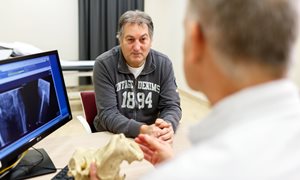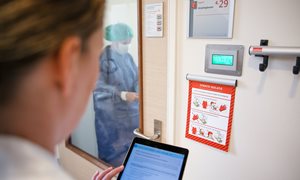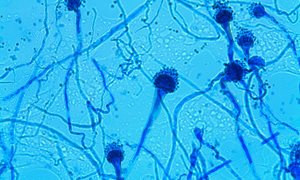
Welcome to the Radboudumc Community for Infectious Diseases (RCI)
The Radboudumc Community for Infectious Diseases (RCI) brings together healthcare professionals and scientists who are committed to advancing the fight against infectious diseases.
read moreWelcome to the Radboudumc Community for Infectious Diseases (RCI)
Infectious diseases remain one of the most pressing global public health challenges. From tropical infections like malaria and dengue to global pandemics such as COVID-19, and the growing threat of antimicrobial resistance: these conditions continue to impact individuals, communities, and healthcare systems worldwide.
The Radboudumc Community for Infectious Diseases (RCI) brings together healthcare professionals and scientists who are committed to advancing the fight against infectious diseases. Within our learning environment, we adopt an integrated approach that spans infection prevention, diagnostics, treatment, care, research, and education. We aim to develop innovative solutions and improve diagnostics, therapies, and control strategies.
RCI focuses on three core pillars:
- Care: Delivering high-quality, patient-centered care with particular expertise in tropical and complex infections.
- Research: Conducting cutting-edge studies on antimicrobial resistance, novel treatments, and preventive strategies.
- Education: Equipping future healthcare professionals with the skills and knowledge to meet tomorrow’s infectious disease challenges.
Through collaboration and knowledge sharing, we join forces to reduce the impact of infectious diseases and contribute to a healthier society.
Join our community and help shape the future of infectious disease care and research.
-
High-dose antibiotic does not reduce mortality in tuberculous meningitisResearchers seek better treatment to prevent brain damage and death17 December 2025
-
Parasite paparazzi take millions of photos of secret malaria proteinsElucidated protein structures offer opportunities for new vaccines9 October 2025
-
Study reveals why people with HIV more often have other health conditionsResearchers use big data to map health in HIV21 August 2025
-
Regional Drive AMS course Caribbeanand ICARS symposium AMR Caribbean23 February 2026 to 28 February 2026
-
Data-driven implementation of behaviour change in Antimicrobial Stewardshipin Low- and Middle-Income Countries (drive-AMS LMICs)25 March 2026 to 27 March 2026
-
Scientific Spring Meeting KNVM & NVMM31 March 2026 to 1 April 2026
SPICE: Expert Registry
The Specialized Program for Infectious Disease Care Everywhere (SPICE) is an expert registry for providing expert consultancy and support matched to the need of healthcare sector in LMICs to ensure standardized and integrated infectious diseases (ID) care.
go to page
Survey: Use of AI within the hospital
With this survey, we want to gain insight into how AI is currently being used within the Radboudumc Community for Infectious Diseases (RCI). The survey will take approximately 5-10 minutes to complete.
read moreSurvey: Use of AI within the hospital
Within Radboudumc, we see a growing interest in the use of artificial intelligence (AI) in clinical practice and research. AI offers opportunities to improve processes, accelerate diagnostics and optimize patient care.
At the same time, we notice that the use and application of AI can differ greatly between departments and functions. With this survey, we want to gain insight into how AI is currently being used within the Radboudumc Community for Infectious Diseases (RCI).
We are curious about your experiences: which AI tools do you already use, what do you encounter, and what are you still missing? In addition, we would like to hear your vision on the future of AI within the hospital. Your input is of great value to jointly determine where the needs lie and how we can meaningfully integrate AI into our work.
We will discuss the results of the survey in the RCI support team and then, based on this, we want to invest in AI applications from RCI, in line with all other initiatives within Radboudumc, to improve (the outcomes of) our work.
The survey will take approximately 5-10 minutes to complete. Thank you in advance for your contribution!
Click here for the survey.
Education
We contribute to the curriculum of Medicine and Biomedical Sciences, which allows general practitioners and biomedical scientists to graduate with a thorough knowledge of infectious disease prevention and a rational antibiotics policy.
go to pagePatient care Infectious Diseases
High-quality patient care is central to the Radboud Community Infectious Diseases of Radboudumc.
We offer specialized care for patients with complex and rare infectious diseases, where personal treatment and innovation go hand in hand.
Our expert areas

HIV human immunodeficiency virus
Radboudumc is one of the 26 HIV treatment centers in the Netherlands go to page
Lyme disease
Radboud university medical center, the RIVM, the Amsterdam UMC, and the Lyme Association make up the Dutch Lyme Disease expertise center. go to page
Malaria
Radboudumc has wide-ranging experience in the diagnosis and treatment of malaria. A great deal of research is done into malaria here, both at Radboudumc and in the tropics.
go to page
Mycobacterial infectious diseases Tuberculosis and non-tuberculous mycobacteria (NTM)
Radboud university medical center is a nationally recognized expertise center for tuberculosis and NTM.
go to page
Orthopedic infections
Radboud university medical center is one of the national centers designated for the treatment of patients with complex orthopedic prosthesis infections, particularly infections of hip and knee prosthetics. We fulfill a regional and national referral function. go to page
Outbreak Management care of very infectious patients
We use our expertise in caring for very infectious patients at Radboud university medical center. We also participate in national advisory bodies and play a coordinating role in outbreaks across the world. go to page
Q Fever
Radboud university medical center is a recognized expertise center for the treatment of Q fever.
go to page
Fungal infections
Radboud university medical center, together with CWZ, is a recognized expertise center in the field of fungal infections.
read more (in Dutch)
Antimicrobial Stewardship and Infection Prevention
We focus on to the development and implementation of (cost)effective, timely, safe, and person-centered diagnostics, antimicrobial therapy and infection prevention measures for patients with -a risk of- an infectious disease.
read moreAntimicrobial Stewardship and Infection Prevention
We focus on to the development and implementation of (cost)effective, timely, safe, and person-centered diagnostics, antimicrobial therapy and infection prevention measures for patients with -a risk of- an infectious disease. We are committed to improve patient care safely in order to achieve the best patient outcomes.
With the ultimate aim of curbing antimicrobial resistance, the research focus is on everyday patient problems - both in high and low resource settings - to have global impact. Providing the evidence for appropriate patient care.
Antimicrobial resistance (AMR) is considered a global health threat as infections become more difficult to treat. There are two cornerstones of reducing the development of AMR: Antimicrobial Stewardship and Infection Prevention. The Radboudumc Community for Infectious Diseases (RCI) has always played an important role in the area of AMR, both nationally and internationally.
Our research focuses on the following main questions:
- What innovative diagnostic, antimicrobial therapy or infection prevention measure improves patient outcomes, reduces costs and/or limits the development of antimicrobial resistance?
- How can these evidence-based interventions be implemented into daily practice?
Innovative diagnostics, antimicrobial therapies and infection prevention measures
This research represents the development and clinical testing of innovative diagnostics, antimicrobial therapy or infection prevention measures. This ‘man’-based research provides scientific evidence for the added value of the tested interventions.
Implementation of evidence-based interventions into daily practice
This behavioural research aims at the development and testing of innovative implementation strategies to introduce evidence-based interventions in daily practice. We explore the gap between evidence and practice and its determinants. The latter information is crucial when designing implementation strategies aimed at improving care. This ‘population’-based research provides scientific evidence for the added value of the tested improvement interventions.
Our people
-
Koen van Aerde kinderarts-infectioloog/immunoloog
-
Martin Boeree emeritus hoogleraar
-
Lindsey te Brake researcher Apotheek



